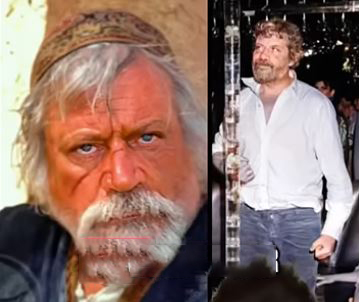
Reed’s reputation as a hard-drinking, hard-living actor was something he himself did little to deny. Stories about his drinking habits are legendary—whether it was drinking before, during, or after filming, or challenging people to drinking contests at bars, Oliver Reed was known to push the limits of alcohol consumption. His larger-than-life persona both on and off the screen made him a household name, though not necessarily for the right reasons. It was often said that Reed’s boozy antics were as much a part of his allure as his acting skills, creating a sort of myth around his lifestyle that only grew with time.
On May 2, 1999, Reed’s life came to a tragic end in a way that almost seemed to be a reflection of his own reckless behavior. He had been filming Gladiator in Malta, a film that would later win several Academy Awards. After a long day of shooting, Reed decided to go out and unwind, as was his custom. That night, he walked into a bar in the town of Valletta, where he began drinking heavily, as he often did. The details of exactly how much Reed drank remain hazy, but various reports suggest that the actor had consumed several pints of beer, along with a good number of shots of rum. By his own admission, he had no intention of stopping anytime soon, as drinking was an integral part of his identity.
At some point during that night, after a few more rounds of drinks, Reed suddenly collapsed and fell into unconsciousness. A short time later, he was declared dead. The cause of death was later revealed to be a heart attack, triggered by the combination of alcohol and Reed’s overall unhealthy lifestyle. However, what truly shocked those who were present at the bar that night was the sheer amount of alcohol Reed had consumed before his sudden death. It’s believed that he was drinking nonstop for hours, with no regard for the limits his body might have.
Reed’s death was a devastating blow to the entertainment world. He had been at the height of his career, making a major comeback in Gladiator, a film that would go on to become a massive success. In the film, Reed played Proximo, a character whose story arc mirrored some of his own life—someone who had lived a hard life, but still had the will to fight on, even in the face of mortality. Tragically, it seems Reed’s own life was a parallel to the character he portrayed—a man who had lived with intensity but ultimately succumbed to his vices.
Oliver Reed’s death raises questions about the dangers of a lifestyle defined by excess and indulgence. He was a man who seemed invincible, someone who could party till the early hours of the morning and drink with the best of them. But his sudden death serves as a reminder that the human body has its limits, and even the most robust of individuals can be brought down by the weight of their own indulgence. In Reed’s case, alcohol proved to be the final, fatal blow.
Despite the reckless nature of his death, Oliver Reed’s legacy endures. His performances in films like Gladiator and The Devils are remembered as some of his finest work, showcasing his talent as a dramatic actor who could command the screen. Reed’s reputation as a wild, unpredictable figure only adds to the mythos of his life, making his death a fitting, albeit tragic, end to a man who lived life on his own terms. It is a reminder that no matter how much fame, fortune, or talent one may have, the consequences of living too recklessly can ultimately prove deadly.
In the years since his death, Reed’s legacy has been immortalized in stories, interviews, and films. He remains a cautionary tale, not only about the dangers of substance abuse but also about the unpredictable nature of life itself. His death, in a way, continues to echo the spirit of a man who lived fast, died young, and left behind a body of work that will be remembered long after his passing. And to this day, the question remains: How much did he drink at the bar before his heart stopped beating? The answer, though tragic, is a part of the larger-than-life story of Oliver Reed—a man who gave everything to his craft, and ultimately paid the price for his unrelenting thirst for life.